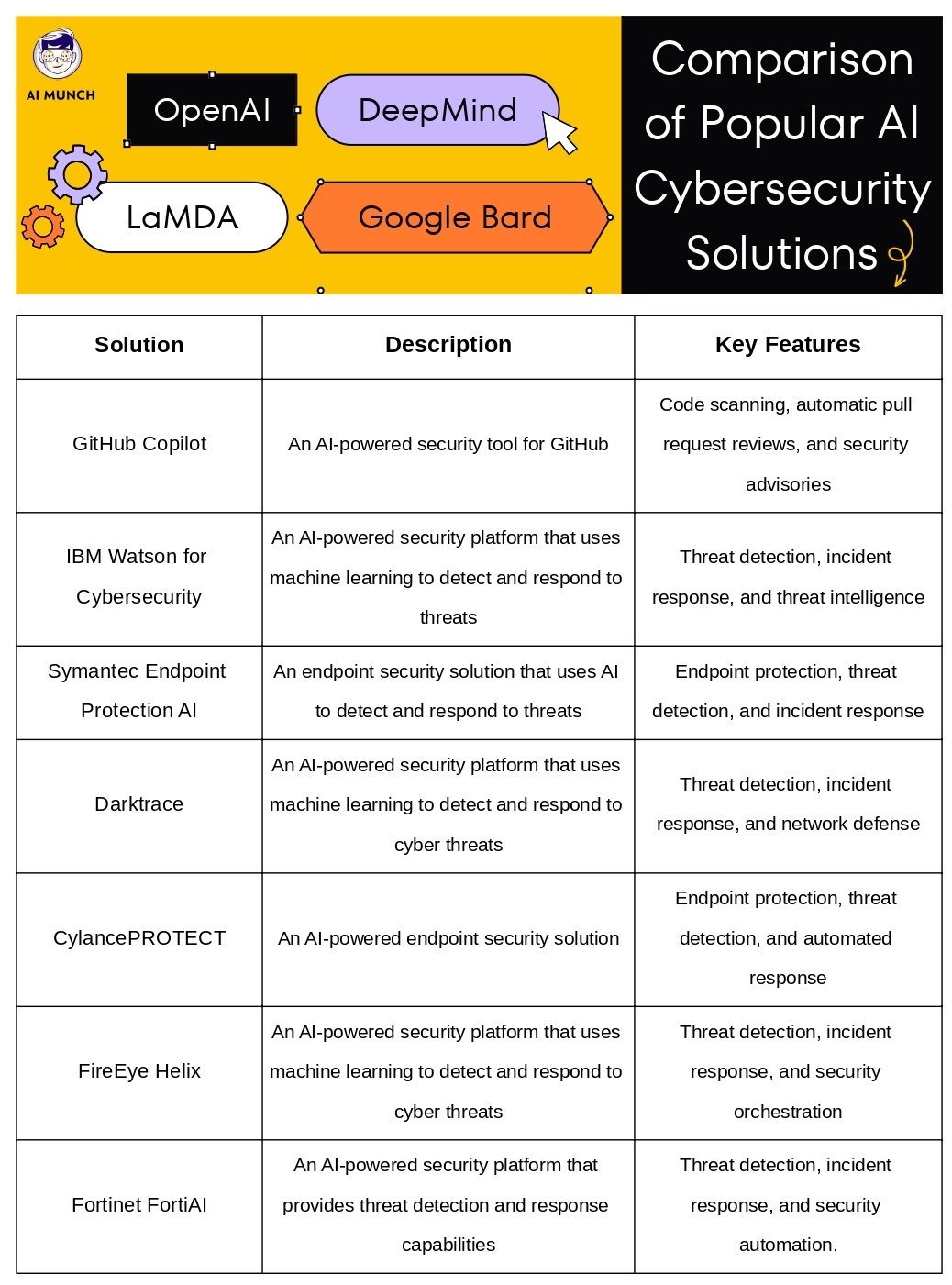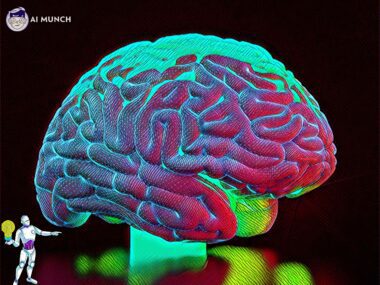I. Introduction
The world is discussing how AI is used in cyber security and the benefits of AI in cyber security. Artificial intelligence has been transforming various industries, and security is no exception. AI in security means using artificial intelligence technologies and techniques to make security systems work better and save money. This can range from AI-powered threat detection and prevention to AI-based vulnerability assessment, and AI-enhanced incident response. The goal of AI in security is to improve organizations’ overall security by automating and streamlining security processes and making it easier for organizations to find and respond quickly to potential threats.
A. Importance of AI in security
The benefits of AI in cyber security are unimaginable. Of course, This Technology is affecting us in many ways. In today’s fast-paced digital world, the number and sophistication of security threats are growing at a rate that has never been seen before. Manual security scans and rule-based security systems are two examples of antiquated security methods that must be revised to keep up with today’s sophisticated threats. By providing real-time threat intelligence, artificial intelligence helps businesses keep up with the ever-evolving security landscape and respond to threats before they cause severe damage.
B. Keywords overview
- AI in security refers to the application of artificial intelligence technologies and techniques in the field of security.
- AI4 Cybersecurity refers to using artificial intelligence in cybersecurity specifically to improve organisations’ overall security posture.
- AI driven network security refers to the use of artificial intelligence to secure network systems and prevent network-based threats.
- GitHub Copilot Security is an AI-powered security solution that helps developers secure their code on GitHub.
- AI data security refers to the use of artificial intelligence to secure data and protect it from potential breaches or unauthorized access.
- AI cybersecurity solutions refer to AI-powered security products and services aimed at providing comprehensive security for organizations.
II. AI in Security
Artificial intelligence has the potential to help with security in the future, and this is very exciting. We have already read about the impact of AI on society. This technology has the potential to radically alter the state of security by equipping businesses with ground-breaking amounts of threat intelligence, allowing them to identify and mitigate dangers swiftly. Organizations will be able to anticipate and prevent security incidents with the help of artificial intelligence in the future rather than detect and respond to them. Because of this, the likelihood of security breaches will decrease, and the security level will increase.
A. How AI is changing the security landscape
Artificial intelligence is transforming the security industry by assisting businesses in automating and streamlining their security processes and providing them with real-time threat intelligence. By doing so, companies can better identify and respond to security threats. This has decreased the likelihood of security breaches and increased security overall. Due to AI’s ability to detect and prevent security incidents before they occur, the demand for manual security scans and rule-based security systems is shrinking.
B. Benefits of AI in security
- Real-time threat intelligence: AI provides real-time intelligence on potential threats, enabling organizations to identify and respond to potential threats quickly.
- Automation of security processes: AI lets organizations automate and streamline security processes, reducing the chance of mistakes and frees staff to work on more important tasks.
- Proactive threat detection: AI enables organizations to proactively detect and prevent incidents, thus eliminating the need for manual security scans and rule-based security systems.
- Increased efficiency: When AI is used in security, it makes systems more efficient as a whole by automating and simplifying security processes. Thus reducing the risk of security breaches and enhancing security overall.
III. AI4 Cybersecurity
AI4 Cybersecurity refers to the use of artificial intelligence in cybersecurity to enhance organisations’ overall security posture. AI4 Cybersecurity solutions analyse security data and identify potential threats in real-time using machine learning algorithms. This lets organizations quickly find and respond to possible security problems, which lowers the risk of security breaches and improves security overall.
A. Impact on the security industry
AI4 Cybersecurity greatly affects the security industry because it gives companies information about threats in real time. Which enables them to detect and respond to potential security incidents on time. This alters the security landscape by eliminating the need for manual security scans and rule-based security systems and enabling organizations to detect and prevent security incidents proactively. AI4 Cybersecurity is also increasing the efficiency of security systems, thereby reducing the risk of security breaches and enhancing overall security.
B. AI4 Cybersecurity available solutions
Some of the AI4 cybersecurity solutions available in the market today include:
Carbon Black: An AI-powered endpoint security solution that provides real-time threat intelligence
Symantec: An AI-powered cybersecurity solution that uses machine learning algorithms to detect and prevent cyber threats
Cylance: An AI-powered cybersecurity solution that uses machine learning algorithms to prevent malware attacks
Darktrace: An AI-powered cybersecurity solution that provides real-time threat detection and response
IV. AI-driven Network Security
By “AI-driven network security,” we mean the practise of employing artificial intelligence to safeguard networks and avert the spread of cybercrime. To do this, we can use machine learning algorithms to monitor network activity in real-time and spot any suspicious activity that may threaten our system’s security. Network security solutions powered by artificial intelligence can help businesses better monitor their networks for threats and respond to them in a timely manner, lowering the likelihood of security breaches and strengthening network security.
A. Real-world use cases
Detecting and preventing DDoS attacks: Distributed Denial of Service (DDoS) attacks can stop networks from working and cause businesses a lot of trouble. But they can be detected and prevented with the help of AI-driven network.
Identifying network-based threats: Network threats, such as malware, phishing attacks, and attempts at unauthorized access, can be detected instantly with the help of AI-driven network.
Improving network visibility: Using artificial intelligence to power network security, businesses can gain better network visibility and respond more swiftly to potential security threats.
B. Benefits of using AI for Network Security
- Real-time threat intelligence: AI-driven network security tells businesses about possible threats all the time, so they can find them quickly and stop them.
- Automation of the Security Process: Networks that are protected by AI-based systems can be automated and streamlined, which reduces the chance of mistakes and frees up staff to work on more important tasks.
- Proactive threat detection: With AI-driven network, businesses can proactively detect and prevent security incidents, negating the need for time-consuming manual security scans and rule-based security systems.
- Increased efficiency: An AI-driven network makes security better by automating and streamlining processes. This makes security breaches less likely.
V. GitHub Copilot Security
GitHub Copilot is why we cannot ignore the benefits of AI in cyber security. This is a security feature of the GitHub platform powered by artificial intelligence. It helps programmers fix security flaws in their code. When using GitHub, developers can get real-time security recommendations from GitHub Copilot as they code, allowing them to spot and fix potential security flaws before they become problems.
A. How it’s using AI for security
With the help of AI, GitHub Copilot can inspect code in real-time and offer instantaneous recommendations for improving code security. This is achieved by employing machine learning algorithms to detect widespread security flaws and offer remediation advice. Further, to provide developers with a complete security solution, GitHub Copilot can integrate with other security tools like static analysis tools.
B. Benefits of using GitHub Copilot Security
- Real-time security recommendations: GitHub Copilot delivers real-time security advice, enabling developers to quickly identify and resolve security concerns before they become problematic.
- Integration with Other Tools: GitHub Copilot gives developers a complete security solution by integrating with other security tools, such as tools for static analysis.
- Improved security posture: GitHub Copilot enhances an organization’s security posture by assisting developers in identifying and resolving security problems.
- Increased efficiency: GitHub Copilot improves the efficiency of the development process by enabling developers to detect and resolve security vulnerabilities in real-time.
VI. AI Data Security
AI data security refers to the use of artificial intelligence to secure data and prevent data-based threats. Using machine learning algorithms to identify potential security threats in real-time by analyzing data. Artificial Intelligence data security solutions can assist organizations in detecting and responding to potential security incidents faster, thereby reducing the risk of security breaches and enhancing data security overall.
A. Real-world use cases
Detecting and preventing data breaches: Data breaches expose sensitive information and can cause significant damage to organisations; AI can help detect and prevent such violations.
Identifying data-based threats: AI can find threats in real-time, like phishing, malware, and attempts to break in.
Improving data visibility: Organizations can benefit from increased data visibility thanks to AI data security, allowing them to identify and respond to potential security incidents swiftly.
B. Benefits of using AI for data security
- Real-time threat intelligence: Using AI to protect data gives businesses real-time information about threats, which helps them find and stop possible security breaches quickly.
- Automation of security processes: By automating and streamlining security processes, AI data security helps businesses reduce the likelihood of human error and reallocate resources to making crucial decisions.
- Proactive threat detection: Organizations can use AI data security to reduce the need for time-consuming and error-prone manual security scans and rule-based security systems, allowing them to focus instead on proactive detection and prevention of security incidents.
- Increased efficiency: AI data security improves data security by automating and streamlining security processes, thereby decreasing the likelihood of security breaches.
VII. AI Cybersecurity Solutions
AI cybersecurity solutions are AI’s applications for keeping a company’s data and systems safe. Cybersecurity solutions powered by artificial intelligence can be used to do things like spot and thwart attacks, streamline previously manual procedures, and boost overall system performance.
A. List of popular AI Cybersecurity Solutions
- GitHub Copilot
- IBM Watson for Cybersecurity
- Symantec Endpoint Protection AI
- Darktrace
- CylancePROTECT
- FireEye Helix
- Fortinet FortiAI
B. Benefits of using AI Cybersecurity Solutions
Better threat detection: AI cyber security solutions can help businesses find and respond quickly to possible security problems by giving them better ways to detect threats.
Automated security processes: Reduce the chance of human error by automating security processes. This frees up security professionals to work on more strategic projects.
Increased efficiency: This boosts the effectiveness of the security system, lowering the probability of security breaches and strengthening the security posture as a whole.
Real-time threat intelligence: Collect and analyze data in real-time to get instant information about possible threats and take corrective steps for the company.

VIII. Conclusion
In this article, we looked at artificial intelligence’s role in improving security and how that role may evolve in the future. We delved into AI4 cybersecurity and AI-driven network and talked about the many ways in which artificial intelligence can improve these fields. Furthermore, we discussed the features and advantages of GitHub Copilot Security and other AI data security and cybersecurity options.
Final thoughts
There are numerous advantages to using artificial intelligence in cyber security. So, there is reason to be optimistic about the future of AI security. Artificial intelligence technology will continue to play an ever-increasing role in security. Artificial intelligence can help businesses make their workplaces safer for their employees by making it easier to find and fix security problems. Security professionals should use AI technology to make their organizations safer and invest in AI-based cybersecurity solutions. Artificial intelligence technology makes it simpler for businesses to detect threats, automate security processes, and obtain up-to-the-minute information about potential hazards. Because of this, it is an indispensable component of any contemporary security strategy.
FAQs
AI enhances traditional security measures by automating repetitive tasks, detecting threats, and responding in real-time to incidents. AI algorithms look at huge amounts of data, find patterns and outliers, and respond automatically to possible dangers.
AI-powered threat detection, network defence, endpoint protection, and incident response are examples of AI in security. AI can also be utilised in security operations centres (SOCs) to analyse massive data sets and identify potential threats.
AI in security refers to the application of artificial intelligence technology to improve the effectiveness and efficiency of security systems. AI automates security tasks and detects and responds to threats and incidents.
The benefits of AI in cyber security are countless. It can handle a huge amount of data and find patterns that security experts may not be able to see. Algorithms based on artificial intelligence can rapidly detect potential threats and respond to incidents in real time, reducing security breaches risk.
As AI technology continues to develop and its security application becomes more widespread, the future of AI security has excellent potential. AI can significantly automate security operations, detect and respond to threats, and enhance overall security posture.
AI is transforming cyber security by automating repetitive tasks and detecting and responding to threats in real time. Artificial intelligence provides security professionals with previously impossible insights using conventional security methods. With AI, security systems can defend against cyber threats more efficiently, effectively, and proactively.
Some disadvantages of AI in security include the potential for false positive or negative results, the need for large amounts of data to train AI algorithms, and the risk of AI systems being hacked or manipulated. AI algorithms can also reinforce biases in the data they are trained on, leading to unfair treatment or discriminatory results.
AI will only partially replace humans in cyber security. Security systems still require human expertise and discretion to interpret results and make decisions. Instead, AI will complement and enhance human security professionals’ capabilities, thereby enhancing security operations’ efficiency and effectiveness.
AI and cyber security are complementary technologies essential for achieving a high level of security. There are tons of benefits of AI in cyber security. This can automate tasks, detect and respond to threats, and provide insights not possible with conventional security techniques. Human security professionals must interpret results, make decisions, and provide expertise and judgment that AI cannot provide.
Do you want to read more? Check out these articles.











10 comments